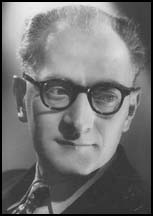Guy Mollet
|
|
Guy Mollet (31 December 1905 - 3 October 1975), French politician, was born in Flers, in Normandy, the son of a textile worker. He was educated in Le Havre and became a school teacher in Arras. Like most teachers, he was an active member of the French Socialist Party, then called the SFIO, and in 1928 he bcame SFIO Secretary for the Pas-de-Calais region. He joined the French Army in 1939 and was taken prisoner by the Germans. Released after seven months, he joined the Resistance in the Arras area and was three times was arrested and interrogated by the Gestapo.
In October 1945, Mollet was elected to the National Assembly for Pas-de-Calais. In 1946 he became Secretary-General of the Socialist Party and served as a minister in the government headed by Léon Blum. In 1950-51 he served as Minister for European Relations in the government of the Radical René Pleven, and in 1951 he was Deputy Prime Minister in the government of Henri Queuille. He represented France at the Council of Europe, and was President of the Socialist Group on the Council's Assembly. From 1951 to 1969 he was Vice-President of the Socialist International.
After the 1955 elections, Mollet formed a coalition with the leader of the left wing of the Radical Party, Pierre Mendès-France, and formed a government in January 1956. Although Mollet wanted to concentrate on domestic issues, he found himself confronted with a major foreign policy issue, the Suez Crisis, when the President of Egypt, Gamal Abdel Nasser, nationalised the Suez Canal.
Anthony Eden, the British Prime Minister, feared that Nasser intended to cut off oil supplies to Europe. In October 1956 Mollet, Eden and the Israeli Prime Minister, David Ben-Gurion, met in secret and agreed to make a joint attack on Egypt. The Israelis invaded Egypt, and British and French troops occupied the Suez Canal area. But the invasion met with unexpected opposition from the United States, and Britain and France were forced into a humiliating backdown. Eden resigned, but Mollet survived the crisis, despite fierce criticism from the left.
Like the rest of the French left, Mollet opposed French colonialism in Africa, and had supported Mendès-France's efforts in office to withdraw from Tunisia and Morocco. Mollet's government was left with the issue of Algeria, where the presence of a million French settlers made a simple withdrawal politically impossible (see also Algerian War of Independence).
Mollet's policy was to negotiate with the Algerian nationalists, who were conducting a campaign of terrorism against the French settlers. Once in office, however, he changed his mind and argued that the terrorists must be defeated before negotiations could begin. He poured French troops into Algeria, where they conducted a savage campaign of counter-terrorism and torture. This was too much for most French socialists, and Mollet's government collapsed in June 1957 on the issue of taxation to pay for the Algerian War.
Mollet's was the last government formed by the SFIO, which was in increasing decline, and also the last stable government of the Fourth Republic. The unwinnable war in Algeria caused a crisis in 1958 in which Charles de Gaulle returned from retirement and in effect seized power. Unlike most of the French left, Mollet supported him on the grounds that France needed a new constitution which would allow the formation of strong governments. De Gaulle appointed him one of four Secretaries of State in his first cabinet.
Mollet resigned from de Gaulle's cabinet in 1959 and did not hold office again. He remained Secretary General of the SFIO, but under de Gaulle's new system, the Fifth Republic, it was a powerless opposition party, and by the 1960s it was in terminal decline. Mollet resigned in 1969, and supported François Mitterrand's new Socialist Party, formed in 1971.
Guy Mollet died in Paris in 1975. Although he was a lifelong Marxist, he has a posthumous reputation as a right-wing machine politician who betrayed socialist ideals over Algeria and by supporting de Gaulle in 1958. His biography, by Denis Lefebvre, was called Guy Mollet: Le mal aimé (Guy Mollet: The Unpopular).
Mollet's Ministry, 1 February 1956 - 13 June 1957
- Guy Mollet - President of the Council
- Christian Pineau - Minister of Foreign Affairs
- Maurice Bourgès-Maunoury - Minister of National Defense
- Jean Gilbert-Jules - Minister of the Interior
- Robert Lacoste - Minister of Finance and Economic Affairs
- André Morice - Minister of Industry
- François Mitterrand - Minister of Justice
- René Billères - Minister of National Education, Youth, and Sport
- François Tanguy-Prigent - Minister of Veterans and War Victims
- Gaston Defferre - Minister of Overseas France
- Albert Gazier - Minister of Social Affairs
- Pierre Mendès-France - Minister of State
Changes
- 14 February 1956 - Paul Ramadier succeeds Lacoste as Minister of Finance and Economic Affairs. Morice leaves the ministry and is not replaced as Minister of Industry.
- 21 February 1956 - Jacques Chaban-Delmas enters the Ministry as Minister of State.
- 23 May 1956 - Mendès-France leaves the ministry
| Preceded by: Daniel Mayer | General Secretary of the French Section of the Workers' International 1946–1969 | Succeeded by: Alain Savary |
| Preceded by: — | Minister of State 1946–1947 | Succeeded by: — |
| Preceded by: — | Minister for the Council of Europe 1950–1951 | Succeeded by: — |
| Preceded by: — | Deputy Prime Minister of France with René Pleven and Georges Bidault 1951 | Succeeded by: René Mayer |
| Preceded by: Edgar Faure | Prime Minister of France 1956–1957 | Succeeded by: Maurice Bourgès-Maunoury |
| Preceded by: — | Deputy Prime Minister of France 1958 | Succeeded by: — |
| Preceded by: — | Minister of State 1958 | Succeeded by: — |
| Preceded by: — | Minister of General Civil Servant Status 1958–1959 | Succeeded by: — |

